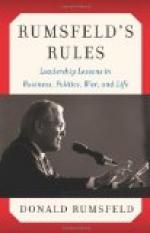After reconnaissance on Friday and Saturday (October 27th-8th) Sir George White, finding a large Boer force in front of him at Ladysmith, determined to hit out on Monday. Suppose Ladysmith to be the centre of a compass card, the Boers were spread across the radii from N. to E. Sir George meaning to clear the Boers from a position near N.E. prepared to move forward towards N.E. and towards E., sending in each direction about a brigade of infantry and a brigade division of field artillery. He sent two battalions and a mounted battery towards N. The party sent to N. started after dark on Sunday; the other parties, making ready in the night, set forward at dawn. There was no enemy in position at N.E. The force sent towards E. pushed back a Boer force, which retreated only to enable a second Boer force to take the British E. column in flank—apparently its left flank. The N.E. column had to be brought up to cover the retirement of the E. column. When these two columns returned to Ladysmith the N. column was still out. Long after dark Sir George White learned that the N. column, which had lost its battery and its reserve rifle ammunition by a stampede of the mules, had been surrounded by a far stronger Boer force, had held its ground until the last cartridge was gone, and that then the survivors had accepted quarter and surrendered.
Sir George White manfully takes upon himself the blame for this misfortune. His portentous blunders were in sending out the party to a distance and in taking no steps to keep in communication with it or to support it. The detachment of a small party to a distant point is a habit of Indian warfare. It is out of place against an enemy of European race, for the detachment is sure to be destroyed if the enemy has a capable commander. Every man in the Ladysmith force will have felt on Tuesday that the commander had make mistakes which he ought not to have made. The question is what effect this consciousness will have upon the spirits of the force.
Sir George White was reinforced before and during the action, a battalion of rifles having arrived in the morning and a party of bluejackets with heavy quick-firers coming up during the day. Further reinforcements were sent towards him from the squadron after the action, so that his force is still about sixteen thousand. If he does not elect to retreat, a course which might demoralise the troops, he may well be able to defend Ladysmith until relieved; but the first business of the troops now on their way out will be to relieve him, and until that has been arranged for, it is to be feared that Mafeking and Kimberley must wait.
FOOTNOTES:
[Footnote A: Thirteen weeks, as we now (March) know from the official correspondence.]
[Footnote B: I should have said December.]




